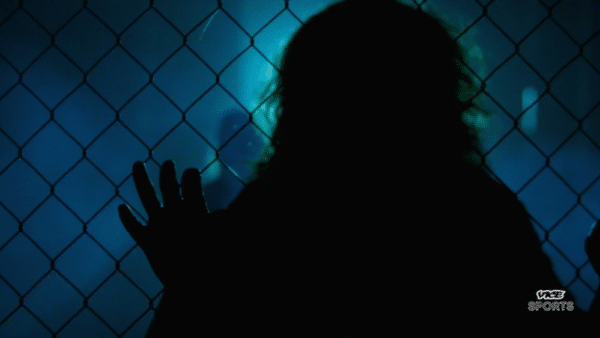The Hell in a Cell match from King of the Ring ’98 is easily one of the most important wrestling matches of all time. Mankind (Mick Foley) and Undertaker ushered in a new era of brutality with it, moving the line further up in terms of what was allowed in the ring and which rules could be broken on primetime television. Bear in mind that Japan had already been pushing that envelope for years with barbed wire matches and explosive ring bouts. ECW was already up and running, too. What Mankind and Taker did was bring some of that extreme type of wrestling to the biggest stage of them all: a WWE Pay Per View event.
It was only fitting that Vice’s Dark Side of the Ring opened its sixth season with an exploration of this watershed moment in wrestling history, with a focus on Mick Foley and the cost of legacy. Longtime wrestling fans won’t necessarily learn anything new here, but Foley and crew squeeze every bit of emotion out of this harrowing retelling of Hell in a Cell. And it pays off.
If you’ve never even heard of this match, the episode does a great job of catching you up with a bit of the Mankind/Undertaker feud that the WWE cooked up to justify the use of the cell. Foley takes viewers on a quick but powerful journey through his hardcore matches in Japan and how they led to his jump back to the United States at a time when the WWE was looking for someone who could measure up to The Undertaker in a big way. The Devil Himself, Vince McMahon, showed little interest in Foley initially because he didn’t look like a superstar. But that would all change in King of Ring ’98. The WWE had already gone through two previous Hell in a Cell matches, and expectations were running high (especially Shawn Michaels and Undertaker churned out a classic at Badd Blood 1997).
The episode does a near blow-by-blow recap of the match with Foley, his family, ex-WWE commentator JR, and WWE referees and doctors chiming in to account for the unpredictability of the match. Everyone agreed that the line between real and fake became blurred that night as Foley received some of the roughest and scariest bumps of his career. Throughout, Foley comes across as somewhat regretful of the risks he took, but never to the point of questioning his decision to go through with it.

If there’s a theme that runs through this season’s opener it’s that of the highly unbalanced risk vs. reward mentality that consumes ambitious wrestlers. It questions the price of becoming one of the best in the business. There’s no denying that wrestling asks for a lot in exchange for glory and immortality, and even then there are no guarantees they’ll be attained. You can be a great wrestler, but never quite reach greatness because you were short of that one explosive match that cements your place in sports entertainment history.
Foley had that match in Hell in a Cell, but the episode makes it painfully clear that he is now paying for it in his post-wrestling days. What the cost of that looks like is explored well and it paints a very tragic and worrying picture of what awaits Foley should his concussions catch up to him sooner rather than later. In fact, they already have in several ways.
Episode 1 of the latest season of Dark Side of the Ring is perhaps the series’ most personal yet. There’s a sadness coursing through it given the damage Foley has essentially inflicted on himself for our viewing pleasure. But it is impossible to separate that from the fact it resulted in one of the most important moments in the history of the industry. Commitment to what Foley himself refers to as “fantasy combat” has never looked the way it did in that cell. Despite Undertaker winning the match, Mankind emerged a newly minted legend in the eyes of WWE fans at that precise moment. He went through Hell to achieve that. Unfortunately, it looks like Hell kept more of him than he had bargained for.
Source link